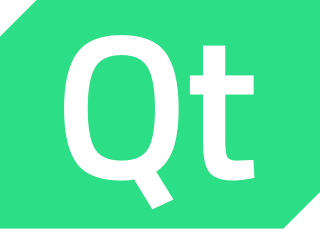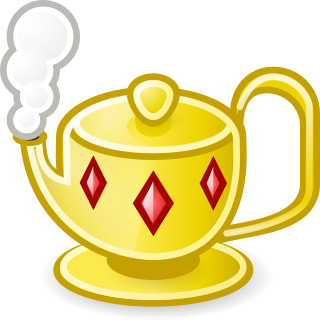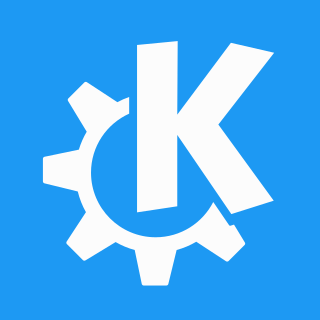
The GNU Lesser General Public License (LGPL) is a free-software license published by the Free Software Foundation (FSF). The license allows developers and companies to use and integrate a software component released under the LGPL into their own software without being required by the terms of a strong copyleft license to release the source code of their own components. However, any developer who modifies an LGPL-covered component is required to make their modified version available under the same LGPL license. For proprietary software, code under the LGPL is usually used in the form of a shared library, so that there is a clear separation between the proprietary and LGPL components. The LGPL is primarily used for software libraries, although it is also used by some stand-alone applications.

Qt is cross-platform software for creating graphical user interfaces as well as cross-platform applications that run on various software and hardware platforms such as Linux, Windows, macOS, Android or embedded systems with little or no change in the underlying codebase while still being a native application with native capabilities and speed.

Bluefish is a free and open-source software advanced text editor with a variety of tools for programming and website development. It supports coding languages including HTML, XHTML, CSS, XML, PHP, C, C++, JavaScript, Java, Go, Vala, Ada, D, SQL, Perl, ColdFusion, JSP, Python, Ruby, and shell. It is available for many platforms, including Linux, macOS and Windows, and can be used via integration with GNOME or run as a stand-alone application. Designed as a compromise between plain text editors and full programming IDEs, Bluefish is lightweight, fast and easy to learn, while providing many IDE features. It has been translated into 17 languages.

wxWidgets is a widget toolkit and tools library for creating graphical user interfaces (GUIs) for cross-platform applications. wxWidgets enables a program's GUI code to compile and run on several computer platforms with minimal or no code changes. A wide choice of compilers and other tools to use with wxWidgets facilitates development of sophisticated applications. wxWidgets supports a comprehensive range of popular operating systems and graphical libraries, both proprietary and free, and is widely deployed in prominent organizations.
A GPL linking exception modifies the GNU General Public License (GPL) in a way that enables software projects which provide library code to be "linked to" the programs that use them, without applying the full terms of the GPL to the using program. Linking is the technical process of connecting code in a library to the using code, to produce a single executable file. It is performed either at compile time or run-time in order to produce functional machine-readable code. The Free Software Foundation states that, without applying the linking exception, a program linked to GPL library code may only be distributed under a GPL-compatible license. This has not been explicitly tested in court, but linking violations have resulted in settlement. The license of the GNU Classpath project explicitly includes a statement to that effect.
In computing, Java Web Start is a deprecated framework developed by Sun Microsystems that allows users to start application software for the Java Platform directly from the Internet using a web browser. The technology enables seamless version updating for globally distributed applications and greater control of memory allocation to the Java virtual machine.

Lazarus is a free, cross-platform, integrated development environment (IDE) for rapid application development (RAD) using the Free Pascal compiler. Its goal is to provide an easy-to-use development environment for programmers developing with the Object Pascal language, which is as close as possible to Delphi.
The following tables compare general and technical information for a number of HTML editors.

Komodo Edit is a free and open source text editor for dynamic programming languages. It was introduced in January 2007 to complement ActiveState's commercial Komodo IDE. As of version 4.3, Komodo Edit is built atop the Open Komodo project. Komodo IDE is no longer supported and maintained by developers for Python.

TextMate is a general-purpose GUI text editor for macOS created by Allan Odgaard. TextMate features declarative customizations, tabs for open documents, recordable macros, folding sections, snippets, shell integration, and an extensible bundle system.
Bigloo is a programming language, a dialect of the language Lisp, an implementation of the language Scheme. It is developed at the French IT research institute French Institute for Research in Computer Science and Automation (INRIA). It is oriented toward providing tools for effective and diverse code generation that can match the performance of hand-written C or C++. The Bigloo system contains a Scheme compiler that can generate C code and Java virtual machine (JVM) or .NET Framework (.NET) bytecode. As with other Lisp dialects, it contains an interpreter, also termed a read-eval-print loop (REPL). It is free and open-source software. The run-time system and libraries are released under a GNU Lesser General Public License (LGPL). The compiler and programming tools are released under a GNU General Public License (GPL).

Aptana, Inc. is a company that makes web application development tools for use with a variety of programming languages. Aptana's main products include Aptana Studio, Aptana Cloud and Aptana Jaxer.

qooxdoo is an open-source Ajax web application framework. It is an LGPL- and/or EPL-licensed client-side and server-agnostic solution, and includes support for professional JavaScript development, a graphical user interface (GUI) toolkit and high-level client-server communication.

Ext JS is a JavaScript application framework for building interactive cross-platform web applications using techniques such as Ajax, DHTML and DOM scripting. It can be used as a simple component framework but also as a full framework for building single-page applications (SPAs).

Geany is a free and open-source lightweight GUI text editor using Scintilla and GTK, including basic IDE features. It is designed to have short load times, with limited dependency on separate packages or external libraries on Linux. It has been ported to a wide range of operating systems, such as BSD, Linux, macOS, Solaris and Windows. The Windows port lacks an embedded terminal window; also missing from the Windows version are the external development tools present under Unix, unless installed separately by the user. Among the supported programming languages and markup languages are C, C++, C#, Java, JavaScript, PHP, HTML, LaTeX, CSS, Python, Perl, Ruby, Pascal, Haskell, Erlang, Vala and many others.
Web2py is an open-source web application framework written in the Python programming language. Web2py allows web developers to program dynamic web content using Python. Web2py is designed to help reduce tedious web development tasks, such as developing web forms from scratch, although a web developer may build a form from scratch if required.

The GNU General Public License is a series of widely used free software licenses or copyleft that guarantee end users the four freedoms to run, study, share, and modify the software. The license was the first copyleft for general use and was originally written by Richard Stallman, the founder of the Free Software Foundation (FSF), for the GNU Project. The license grants the recipients of a computer program the rights of the Free Software Definition. These GPL series are all copyleft licenses, which means that any derivative work must be distributed under the same or equivalent license terms. It is more restrictive than the Lesser General Public License and even further distinct from the more widely used permissive software licenses BSD, MIT, and Apache.

KDE Projects are projects maintained by the KDE community, a group of people developing and advocating free software for everyday use, for example KDE Plasma and KDE Frameworks or applications such as Amarok, Krita or Digikam. There are also non-coding projects like designing the Breeze desktop theme and iconset, which is coordinated by KDE's Visual Design Group. Even non-Qt applications like GCompris, which started as a GTK-based application, or web-based projects like WikiToLearn are officially part of KDE.










